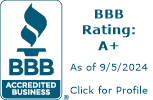The word “humidity” often has a bad connotation in Florida as the humidity levels can become unbearable. At 35 percent to 45 percent humidity, the air feels comfortable — not too dry or muggy, but just right. Humidity in this range also has benefits on health; it keeps skin soft, lips moist, and respiratory allergies at bay. But humidity fluctuates from its ideal 40-percent average due to changes in the climate, season, and other natural factors.
It’s at these uncomfortable levels where humidifiers and dehumidifiers play a role and adjust humidity levels. Yet while these devices raise or lower humidity levels to desired levels, they also pose risks for mold and fire damage in homes. Maven Construction Group Inc explains what you should know about humidifiers and dehumidifiers, including when and how to safely use (and avoid) them.
How Humidifiers & Dehumidifiers Function
Humidifiers and dehumidifiers share the same purpose: to adjust the humidity levels in your home. Where the devices diverge is in their operations and effects on humidity levels.
Humidifier
A humidifier uses a superheated coil to vaporize water in a tank. A fan then blows the vapor into the air to increase the humidity levels. One tip from Gainesville restoration experts, who understand how humidity affects items of property made of different materials, is to use humidifiers in rooms where there are delicate wood items like guitars and antique furniture to prevent warps or splits in the wood.
Dehumidifier
A dehumidifier works like an air conditioner: moist air enters the machine, an evaporator coil cools that air and causes it to discharge its water content into a container, and the now-dry air blows into your home. Dehumidifiers have many health applications in humid areas. Moist air is hospitable to dust mites, mold, and mildew. By reducing the humidity levels indoors, dehumidifiers also decrease the likelihoods of inhabitants suffering respiratory irritations caused by allergens. Also, for purposes related to water damage or mold remediation, restoration specialists may use dehumidifiers to dry the affected areas in homes.
Which Do You Need?
Many people own both a humidifier and dehumidifier and alternate using them based on the season. Humidifiers are often used in winter to combat dry air and dehumidifiers in summer to prevent the outdoor mugginess from affecting their home or business. If you’d like to make a more scientifically based decision, you can refer to a hygrometer, which is a device that measures humidity. Measurements below 35 percent humidity suggest a humidifier is required, and readings over 45 percent humidity make the same case for using a dehumidifier.
Common Problems With Humidifiers & Dehumidifiers
Humidifiers and dehumidifiers must be operated according to the instructions in their respective owner’s manuals. This includes following the technical guidelines such as filling the water in a humidifier to the correct level, or cleaning a dehumidifier as frequently as suggested, as well as being vigilant about monitoring the devices when they’re operating. When these steps aren’t taken, humidifiers and dehumidifiers can pose safety hazards of various kinds.
Mold
Following the rainy season in Gainesville, mold damage restoration services reach their zenith. The reason is simple: mold. Mold stems from numerous types of fungi (including deadly strains) and thrives in moist conditions. Mold also loves biological hosts, such as the wood building materials that comprise your home. And when mold spreads, it does so with impunity. Humidifiers exacerbate the risks of mold in two ways. First, when the humidity level isn’t monitored, a humidifier can create overly damp areas where mold festers. Second, but equally startling, is that mold can grow in the humidifier itself, blowing mold spores into the air. Breathing in these spores, furthermore, can cause respiratory illness, lung inflammation, and other effects on your health.
Fire
Some models of humidifiers and dehumidifiers have been known to self-combust. Of course, when they’re used correctly, the chance of a device starting on fire is low. But as fire damage restoration experts know all too well, humidifiers and dehumidifiers that are left running unsupervised can build up enough heat to melt and ignite. The fire danger from these devices is even worse when they’re dirty; the bacteria, mold, and other grime that accumulate in neglected humidifiers and dehumidifiers can be highly combustible.
Maintaining Your Humidifier or Dehumidifier
There are two ways to avoid having mold develop in your home due to a humidifier. First, monitor the humidity levels in your home with a hygrometer (many thermometers have these built in). When the humidity level indoors approaches 45 percent, turn off the humidifier. Second, clean the humidifier every day; don’t stop at changing the water but also disinfect the surface and between the vents.
Cleaning humidifiers and dehumidifiers is likewise a way to reduce their fire risks. But, most importantly, you must also heed the advice of people who specialize in fire damage reconstruction in Gainesville and never leave on a humidifier or dehumidifier that’s out of your sight. You can also prevent devices from overheating by limiting the duration they operate. If a machine needs to run all day to be effective, it’s probably too small for the area.
At Maven Construction Group, we confront damage to a home or business without a moment wasted. Where some people see a mess or even devastation, we see a pathway to restoration. For mold, fire, and other remediations services, contact Maven Construction Group Inc today!


